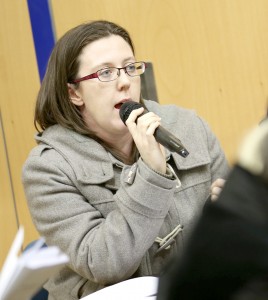
Fermanagh coaching officer, Deirdre Donnelly, has strongly advocated for more reasonable schedules for minor players.
A damning report was delivered earlier this month by the GAA’s Minor Review Workgroup. The Group was established last year to review the Association’s rules and policies on participation in minor and related age grades at club, school and inter-county levels.
“The statistics from the player questionnaires highlight an unsustainable situation for our talented 17 and 18-year-old players,” stated the report. “There is excessive focus on short term results to the detriment of long-term potential. Many young players are participating in excessive training sessions and matches, usually with numerous teams in multiple competitions. The lack of communication between coaches and managers of these teams is emphasised by 81 percent of questionnaire respondents stating that they have felt pressurised not to participate with another team.”
Fermanagh’s Coaching Officer Deirdre Donnelly fully endorsed the findings of the report, saying that the county can not afford to put its head in the sand on the issue.
“Our minor players in Fermanagh were involved in the [Minor Review Workgroup] survey,” said Donnelly. “There was about a dozen players who completed the survey. So whatever is in the report reflects our players’ experience.
“One of the startling findings is that 25 percent or so of players are out training or playing seven days a week, with over 50 percent of players out six days a week. That includes our players. Every manager is looking for their own piece of these players for their short term benefit to get as much out of them as possible in that year, two year period they have them and it’s detrimental to the long term development of these players.
“The other startling fact was over half of players saying they were playing with an injury at 16, 17, 18 years of age. At all levels of the GAA we have to cop ourselves on as regards what we are doing physically and psychologically to these young players,” said Donnelly.
The absence of defined windows for club, school and county activity has been highlighted as a key issue in the National Workgroup’s report.
“This leads to a significant overlap of fixtures in autumn and spring and results in a situation where talented young GAA players often play on multiple teams simultaneously, with the associated demands of being expected to train fully with each team and allowing insufficient recovery time,” said the report.
Donnelly said that schools and county both have to play their part in easing pressures on young players.
“Last year our club minor leagues started at the end of February, start of March on Sunday mornings with the county minors playing the Ulster minor league on a Saturday morning. So we were expecting county minors to play with their county on a Saturday and then play for their clubs on Sunday. That is totally and utterly and against any sports science out there. The minimum recommended rest time is 48 hours and we’re expecting players to play twice within 24 hours. That’s something that we as a county can solve.
“There is a major issue with the schools competitions, particularly the MacRory cup, and the demands that are made at schools level. They have now gone beyond anything I think is wise and acceptable. A lot of guys are there to play football and not for their education, that’s difficult to say, but it is there and it is a major issue. I do think schools have to be taken back under a bit more control by the Association and made accountable for what they are doing to players because they are getting injured and they are not being looked after,” said Donnelly.
The Workgroup has brought forward recommendations to address issues at minor level, setting them out under the four headings of player eligibility, scheduling of competitions, competition format and player welfare and coach education.








